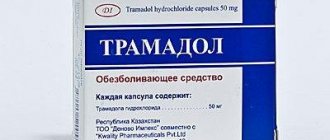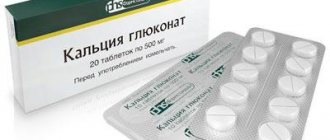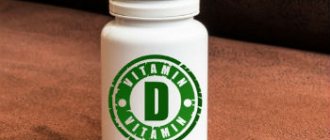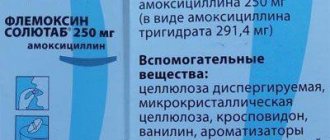An overdose of Aquadetrim can result in dire consequences, so it is important to promptly recognize the symptoms of the problem and understand what to do in such a situation.
Vitamins are a kind of building material for the human body. They ensure the performance of many important functions and are responsible for the tone of all systems and quality of life.
A lack of vitamins often leads to many unpleasant diseases, so it is necessary to regularly replenish them with the help of food and specialized products. Aquadetrim is an aqueous solution of the famous and beneficial vitamin D3, which quickly and effectively eliminates the deficiency of this element and brings all systems back to normal.
This remedy is prescribed even to children starting from one month old, so its effects may seem, at first glance, absolutely safe. In children, under the influence of this drug, bone tissue develops better, teeth and cartilage are formed, and their general condition is strengthened.
But, despite how safe Aquadetrim seems, an overdose of this drug is possible, and sometimes it poses a great danger not only to the baby, but also to the adult.
Vitamin D is considered a completely normal substance for the human body. It is formed when the skin is exposed to direct sunlight, and also penetrates into tissues along with food. Among the functions of this substance are the following:
- ensuring high-quality absorption of calcium and phosphorus in the body;
- regulation of cell reproduction in the human body;
- synthesis of various hormones;
- full participation in the metabolic processes of the body.
Side effects
Hypersensitivity to the components of the drug, hypervitaminosis D (symptoms of hypervitaminosis: loss of appetite, nausea, vomiting, headaches, muscle and joint pain, constipation, dry mouth, polyuria, weakness, mental disorders, including depression, weight loss , sleep disturbance, fever, protein, leukocytes, hyaline casts appear in the urine, increased calcium levels in the blood and its excretion in the urine; calcification of the kidneys, blood vessels, and lungs is possible).
If signs of hypervitaminosis D appear, it is necessary to discontinue the drug, limit the intake of calcium, and prescribe vitamins A, C and B.
First aid and treatment
Gastric lavage
If poisoning is detected, the drug should be discontinued. If a person has been mistakenly prescribed a large dose of medication, the stomach should be rinsed. In case of intoxication in infants, call an ambulance or go to the hospital on their own.
Chronic poisoning with Aquadetrim requires the removal of excess vitamin D from the body. In case of mild intoxication, it is sufficient to discontinue the drug, drink plenty of fluids and take sorbents for three days.
In case of severe poisoning, a person will need hospitalization. The patient is prescribed intravenous administration of a solution of sodium chloride and glucose. To reduce the toxic effect of element D, glucocorticosteroids, vitamin A, and ethylenediaminetetraacetic acid are prescribed. The treatment period is 3–6 days.
Side effects
Usually no adverse reactions occur when taking Aquadetrim in recommended doses.
If there is an individual hypersensitivity to the drug or D3 itself, which is extremely rare, or as a result of using too high doses over a long period, hypervitaminosis D may occur.
Possible side effects from taking it from the outside:
- cardiovascular system – arrhythmia, hypertension;
- Gastrointestinal tract - flatulence, loss of appetite, nausea, vomiting, constipation, dry mouth, abdominal pain, diarrhea;
- CNS – headache, increased drowsiness, various mental disorders, depression;
- urinary system - increased calcium levels, urolithiasis and tissue calcification, uremia, polyuria;
- skin - various hypersensitivity reactions (including urticaria, rash, itching, etc.);
- musculoskeletal system – myalgia, arthralgia, muscle weakness;
- organs of vision – conjunctivitis, photosensitivity;
- metabolism – hypercholesterolemia, weight loss, polydipsia, increased sweating, pancreatitis;
- hepatobiliary system – increased aminotransferase activity;
- psyche – decreased libido.
In addition, there have been reports of rhinorrhea, hyperthermia, and dry mouth from taking Aquadetrim.
Due to the benzyl alcohol content (15 mg/ml), this drug may cause anaphylactoid reactions in some patients.
Purpose
A doctor's recommendation is required to use this medicine. You should not take the drug yourself - an excess of the substance in the body can cause unpleasant symptoms, and treatment in this case will not be effective.
An adult and a child must have serious reasons for taking the drug, which can only be determined by a qualified specialist. Therefore, undergoing a medical examination, tests and examination by a doctor is mandatory before consuming even simple vitamins.
Aquadetrim is in most cases prescribed to children and serves for the treatment or prevention of the following conditions in infants or adult children:
- Rickets, which provokes bone deformation due to impaired mineralization and bone integrity.
- Rickets-like diseases, which, in most cases, are considered congenital and are associated with a lack of Vitamin D in the body.
- A significant lack of vitamin D in the body, which is manifested by brittle nails and bones, noticeable peeling of the skin.
- Aquadetrim is prescribed for osteomalacia, in which bone tissue grows at an accelerated rate, but its mineral composition does not increase.
- Disorders of calcium metabolism, leading to serious diseases, also serve as an indication for prescribing the drug.
- In case of insufficient hormone function or hereditary pathologies, this drug is practically irreplaceable.
Treatment of various diseases in adults with the help of this drug also does not remain aside. The drug is prescribed for the treatment of the following diseases:
- Osteoporosis, in which bone density is significantly reduced.
- The second type of diabetes, in which the development of osteoporosis almost always occurs.
- Any disruptions in the functioning of the heart that provoke the formation of blood clots are an indication for the use of this medicine.
- Multiple sclerosis and even Parkinson's disease can be a reason for prescribing the vitamin.
- Malignant tumors of the ovaries and mammary glands are accompanied by the use of Aquadetrim.
- A specialist can prescribe medication for the development of depression and related conditions.
Overdose
Symptoms: loss of appetite, nausea, vomiting, constipation, anxiety, thirst, polyuria, diarrhea, intestinal colic. Frequent symptoms are headache, muscle and joint pain, mental disorders, incl. depression, stupor, ataxia and progressive weight loss. Renal dysfunction develops with albinuria, erythrocyturia and polyuria, increased potassium loss, hyposthenuria, nocturia and increased blood pressure. In severe cases, clouding of the cornea may occur, and less commonly, swelling of the optic nerve papilla, inflammation of the iris, and even the development of cataracts. Kidney stones may form. The process of calcification of soft tissues occurs, incl. blood vessels, heart, lungs and skin. Cholestatic jaundice rarely develops.
Treatment: stop using the drug and consult a doctor. Take plenty of fluids. If necessary, hospitalization may be required.
A little note for parents
Some mothers are worried about whether an overdose may occur if the baby was given too much of the drug; in fact, signs of an overdose appear a little later. The fact is that this vitamin tends to accumulate in the body of a small child; after a while, the baby experiences the first symptoms of a drug overdose.
This can only happen if the parents constantly gave the child an excessive dose of Aquadetrim. In some cases, the first signs of an overdose appear only several months after the first day of taking the drug.
Contraindications
hypersensitivity to the components of the drug, especially benzyl alcohol;
hypervitaminosis D;
increased concentration of calcium in the blood (hypercalcemia);
increased excretion of calcium in the urine (hypercalciuria);
urolithiasis (formation of calcium oxalate stones);
sarcoidosis;
acute and chronic diseases of the liver and kidneys;
renal failure;
active form of pulmonary tuberculosis.
With caution: state of immobilization; taking thiazides, cardiac glycosides (especially digitalis glycosides); period of pregnancy and breastfeeding; infants with a predisposition to early overgrowth of fontanelles (when the small size of the anterior crown is established from birth).
Symptoms of an allergy to vitamin D
Allergies to the vitamin itself in its pure form are not very common, but, nevertheless, there are more and more complaints from parents of children about allergic manifestations after taking D3. The reason for this, in most cases, is the auxiliary substances contained in aqueous and oily solutions of the vitamin, which, interacting with the body’s proteins, cause a negative reaction.
But among infants you can often find those susceptible to allergies, specifically to vitamins of group “D”. If your child is sensitive to them, he will quickly react accordingly, in the form of one or more of the symptoms listed below that cannot be ignored.
- Rash, hives, various skin redness, photos are widely available on the Internet
- Peeling and itching on the body and head
- Dry skin and oral mucosa
- Whims and anxiety, poor sleep
- Eczema
- Temperature increase
- Bloating, diarrhea, constipation
In severe cases, if measures are not taken in a timely manner, such symptoms are possible.
- Swelling of the oral cavity
- Allergic cough and runny nose
- In rare cases, angioedema and bronchial asthma
I often confuse an allergy to cholecalciferol with its overdose; this is wrong and extremely dangerous, because hypervitaminosis can lead to very serious consequences.
- Loss of appetite
- Thirst
- Labored breathing
- Dehydration due to severe overdose
- Convulsions
- Weakness and fatigue
- Frequent urination
To avoid or minimize the manifestation of allergic reactions to the drug, it must be administered very carefully, in small doses, carefully monitoring the child’s health. With appropriate sensitivity, unpleasant symptoms will not take long to appear and will appear quite quickly.
Indications for use
Tags
If the poisoning is acute, you must call an ambulance. Before the doctors arrive, they resort to the following procedures:
- Provide the patient with peace.
- They give you more to drink. If we are talking about a baby, on the contrary, in the first day they are less likely to be applied to the breast.
- In case of fever, an antipyretic is used.
- In case of increased flatulence, dill water is recommended for the baby.
Antidote
Neutralizes the effect of D ascorbic acid.
Precautionary measures
To ensure that Aquadetrim brings only benefits to your child, follow these precautions:
- Avoid overdose.
- When calculating the daily dose, take into account the intake of vitamin D from other sources (for babies under one year old, these are mainly dry formulas and fortified cereals for dilution with water or milk).
- Large doses of calcium supplements should not be taken simultaneously with Aquadetrim.
- The baby’s daily need for vitamins and the corresponding dosage of medication are determined by the pediatrician individually, taking into account certain factors (living conditions, health status, dietary habits, etc.) and are periodically adjusted.
The dosage depends on the degree of vitamin D3 deficiency and the age of the baby.
- If therapeutic (that is, not prophylactic, but therapeutic) doses of medication are prescribed, periodic laboratory monitoring of the concentration of phosphates and calcium in the child’s urine and blood is important.
Storage conditions for the drug Aquadetrim vitamin D3
At a temperature of 5-25 °C, in a place protected from light.
List of pharmacies where you can buy Aquadetrim vitamin D3:
- Saint Petersburg
Anonymously
Do you need calcium?
Good evening! I want to consult. Last week, my daughter and I visited a gastroenterologist, he said that she had rickets and recommended giving vitamin D 4 drops for a month. Due to my daughter’s allergies, he forbade me to eat dairy products. I read that vitamin D is not absorbed without calcium. Do I need to take extra calcium? if so, which is better calcium gluconate or calcium D3 nycomed, I take Elevit vitamins, will the child overdose? Or should I give my daughter calcium? then which one?...
Read completely…
Urine sample according to Sulkovich
took a urine sample: a two-hour sample, passed it clumsily, one pee. As a result, the result came: the ratio of calcium to creatinine was 0.96, the norm was up to 2.5. I read on the Internet, for a single portion of urine the norm is up to 0.8, so it turns out that we need to focus on the norms for a single portion of urine? I just believe that there is a slight overdose of vitamin D, since we eat the mixture almost all feedings, there is not enough vitamin D, plus 2 drops of Aquadetrim. The child has become very active, takes little naps during the day, and sleeps 12 hours a day. Tell us how an overdose manifests itself...
Aquadetrim, an overdose of which occurs quite rarely, is used to compensate for Vitamin D deficiency in children, which is necessary for their normal growth and development. The drug is easy to use. Exceeding the dose selected by the doctor contributes to the development of dangerous complications.
Possible diseases
If there is an excess of vitamin D in the body, then a child and an adult may develop the following diseases:
- osteoporosis;
- insufficient amount of minerals in the bones;
- formation of blood clots in blood vessels;
- arthralgia.
A situation with a constant excess of vitamin D in the body is dangerous and can lead to asthenia, excessive bone growth, kyphosis and lordosis. In this case, the child has an increased risk of frequent fractures and dislocations. Specific disorders are characteristic only for the initial stage of development of the disease.
For a newborn baby, the norm for vitamin D intake is 75% of the adult dosage. Its calculation has nothing to do with the weight of the baby. To compensate for the lack of a component in the body, special multivitamin complexes are used.
In the absence of timely assistance, the following complications are likely:
- Emotional imbalance, frequent irritability, stupor.
- Severe headaches and muscle pain.
- Problems with hair growth.
- Exhaustion.
- Slight increase in blood pressure.
- Decrease in daily urine volume.
- Kidney inflammation.
- Formation of sand in the urinary canals.
- Atherosclerosis.
- Tachycardia.
- Babies burp more often after feeding.
Way out of a difficult situation
If an overdose occurs once, then you need to stop using the vitamin for some time, about a week, thereby allowing the body to remove excess D3 from the body.
Once an accurate diagnosis has been established, inpatient treatment can begin. During hospitalization, the infant is placed in a well-ventilated room and complex therapy is prescribed. It is aimed at eliminating intoxication and restoring the previous functions of a small organism.
Also, after diagnosing hypervitaminosis for three years, the baby should be observed in a dispensary, since the disease causes great damage to the tiny body.
Admission rules
The dosage of Aquadetrim for newborns is determined only by a doctor. The age of the patient, his state of health and the degree of vitamin D deficiency are taken into account. Usually, for the purpose of prevention, the drug is prescribed before the child reaches the age of two (during seasons when there is little sun outside).
Mix the required amount of medicine with water.
For ease of administration , dissolve the drug in a spoon with liquid (most mothers use water or breast milk). Another option is to put the medicine directly on your baby's tongue or pacifier. Aquadetrim should be given once a day. The instructions indicate the following dosages (but the pediatrician may prescribe others):
- 1-2 drops per day - prevention of rickets in full-term infants who eat well and spend sufficient time in the fresh air (usually doctors recommend taking the medicine only before the onset of sunny months);
- 2-3 drops per day - prevention of hypovitaminosis D and rickets in twins, premature babies and children living in unfavorable conditions;
- 4-10 drops per day for 4-6 weeks - therapy of rickets (the stage of the disease, the nature of its course, the age and weight of the patient are important);
Analogs
Aquadetrim is often replaced with its structural analogue (a product with the same active ingredient) - Vigantol. This is a solution of colecalciferol in oil, which has identical indications. According to pediatricians, the oil preparation is absorbed somewhat worse than the aqueous Aquadetrim. But the risk of developing an allergy to it is much lower.
An analogue of Aquadetrim is oil-based Vigantol.
On the shelves of pharmacies you can find other medicines that compensate for the lack of vitamin D and prevent its deficiency:
- Vitamin D3 Bon;
- Vitamin D3 100 SD/S dry;
- Videohol;
- Cholecalciferol, etc.
In what cases is Aquadetrim prescribed?
Indications for use of the drug are the prevention and treatment of the following pathologies:
- Rakhita. The disease is accompanied by impaired bone development. Due to a deficiency of calcium and Vitamin D, bone tissues lose density, the skeleton is deformed, and pathological fractures occur.
- Osteomalacia. The disease is accompanied by an increase in the volume of bone tissue. Bones become brittle, and the level of minerals they contain decreases sharply.
- Vitamin D deficiency. The pathological condition is accompanied by delayed psychophysical development, thinning hair, and dry skin.
- Rickets-like syndromes. This group includes diseases in which bone growth is impaired. The limbs and skull become deformed, and the child’s growth slows down.
- Metabolic osteopathy. It occurs against the background of dysfunction of the endocrine system of children; the child’s calcium-phosphorus metabolism changes. The disease affects not only physical but also mental development.
- Osteoporosis. The disease is accompanied by thinning and increased fragility of bones. The disease is more common in adults, but sometimes it is detected in children.
- Hypocalcemic tetany. The pathology is accompanied by convulsive seizures. Its development is facilitated by impaired absorption of calcium and phosphorus.
General information
Aquadetrim is a medication designed to replenish the body’s reserves of vitamin D and regulate the metabolism of phosphorus and calcium. The manufacturer of the medicine is Medana Pharma (Poland). The drug is available in the form of drops - it is a colorless or slightly opalescent liquid, poured into containers made of thick dark glass. The 10 ml containers are equipped with a convenient lid in the form of a dropper dispenser. The medicine has an anise aroma and, judging by reviews, not a very pleasant taste.
Under the influence of sunlight, the body itself produces vitamin D. However, it is not always possible to ensure that the child gets enough exposure to the sun.
The active substance of the drug is colecalciferol (otherwise known as vitamin D3). This is a natural form of vitamin D. The element is highly active.
1 ml of the drug (this is approximately 30 drops) contains about 15,000 IU (international units) of colecalciferol (approximately 375 mcg). For ease of use, the instructions for use (download instructions) indicate the dosage in both IU and drops.
The composition also includes additional components, some of which can cause allergies in young patients: sucrose, citric acid monohydrate, benzyl alcohol, macrogol glyceryl ricinoleate, sodium hydrogen phosphate, flavoring and purified water.
You can buy drops without a prescription. The average price of a 10 ml bottle is 200 rubles. But before starting to use the product, a consultation with a pediatrician is required: only a doctor can prescribe Aquadetrim to a child, since there are contraindications and side effects are possible. In some cases, it is impossible to do without professional monitoring of the condition of the infant taking the medicine.
During the first year of life, it is especially important to prevent a lack of vitamins and minerals.











